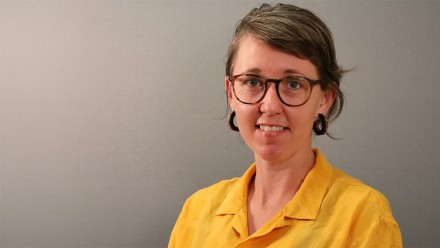Mr David Dumaresq

Contacts
My research and teaching is based around three main areas:
Investigating sustainable systems, including whole farm systems and measuring environmental, economic and social impacts, in particular the sustainability of alternative management practices, especially organic farming. Within farming systems I am researching particular agroecological interactions between farming operations, plant growth and soil ecological function. I am completing a 10 year project comparing the sustainability of organic and conventional wheat farming in Australia. Across wider agricultural systems operations I am investigating farmer's ecological behaviour and its relationship to the development of regulatory frameworks for national and international sustainable agriculture. Within urban systems I am involved in the application of sustainability criteria for planning and construction of human scale communities.
I am developing the role of transdisciplinary studies in environmental research and teaching. This involves collaboration with graduate students in the investigation of the foundations and methods of interdisciplinary science, the development of transdisciplinary methodologies and their application to postnormal science and the development of policy. These studies include the development of human ecology as an approach to understanding social and ecological linkages.
Thirdly I have maintained a strong interest in environmental philosophy, in particular in the ethics of eating including the relationship between ecologically and ethically sound consumption. Other ethical issues of concern include the development of transgenics and the ownership of life.
Research interests
Local, regional, national and global food flows
Ecosystem services in agroecosystems
Food trade and the environmental impacts of outsourcing national food supplies
Carbon fluxes in agrecosystems
Groups
- Researcher, Agriculture, food and nutritional security
- Researcher, Biodiversity
- Researcher, Low carbon and resilient cities
- Researcher, Water and flooding
- Researcher, Adaptation, livelihoods and development in Asia and the Pacific
- Dumaresq, D, Nguyen, V, Pittock, J et al. 2020, 'The paradoxical values of traditional deep water floating rice systems', Global Food Security, vol. 26, pp. 1-9.
- Bammer, G, Mitchell, C, Elford, W et al. 2019, 'A Rich Mosaic of Impact: Julie Thompson Klein's Scholarly Influence in Australia and New Zealand', Issues in Interdisciplinary Studies, vol. 37, no. 2, pp. 144-169.
- Begossi, A, Salivonchyk, S, Hallwass, G et al. 2019, 'Fish consumption on the Amazon: a review of biodiversity, hydropower and food security issues', Brazilian Journal of Biology, vol. 79, no. 2, pp. 345-357.
- Nguyen, V, Dumaresq, D & Pittock, J 2018, 'Impacts of rice intensification on rural households in the Mekong Delta: emerging relationships between agricultural production, wild food supply and food consumption', Food Security, vol. 10, no. 6, pp. 1615-1629.
- Pittock, J, Dumaresq, D & Orr, S 2017, 'The Mekong River: trading off hydropower, fish, and food', Regional Environmental Change, vol. Online, pp. 13pp.
- Nguyen, V, Dumaresq, D & Howie, C 2016, 'Dike Compartments in the Mekong Delta: Case Studies in Water Governance, Farming systems and Adaptation to Water-Regime Changes in An Giang Province, Vietnam', in D J H Blake and L Robins (ed.), Water Governance Dynamics in the Mekong Region, Strategic Information and Research Development Centre, Malaysia, pp. 279-310.
- Pittock, J, Dumaresq, D & Bassi, A 2016, 'Modeling the hydropower - food nexus in large river basins: A Mekong case study', Water, vol. 8, no. 425, pp. 1-18.
- Porter, J, Dyball, R, Dumaresq, D et al 2014, 'Feeding capitals: Urban food security and self-provisioning in Canberra, Copenhagen and Tokyo', Global Food Security, vol. 3, no. 1, pp. 1-7.
- Gross, C & Dumaresq, D 2014, 'Taking the longer view: Timescales, fairness and a forgotten story of irrigation in Australia', Journal of Hydrology, vol. 519, no. PC, pp. 2483-2492.
- Orr, S, Pittock, J, Chapagain, A & Dumaresq, D. 2012, 'Dams on the Mekong River: Lost fish protein and the implications for land and water resources', Global Environmental Change: Part A - Human and Policy Dimensions, vol. 22, no. 4, pp. 925-932.
- Porter, J, Deutsch, L, Dumaresq, D, Dyball, R 2011, 'How will growing cities eat?', Nature, vol. 469, no. 7328, pp. 34-.
- Pearson, D, Henryks, J, Trott, A et al 2011, 'Local food: understanding consumer motivations in innovative retail formats', British Food Journal, vol. 113, no. 6-7, pp. 886-899.
- Dumaresq, D, Carpenter, D & Lockie, S 2010, 'The Human Ecology of Agrobiodiversity', in Stewart Lockie and David Carpenter (ed.), Agriculture, Biodiversity and Markets: Livelihoods and Agroecology in Comparative Perspective, Earthscan Publications Ltd, United Kingdom, pp. 33-46.
- Dumaresq, D & Ecker, S 2010, 'Australia Farmers Responding to the Need for Conversion', in Stephen R. Gliessman, Martha Rosemeyer (ed.), The Conversion to Sustainable Agriculture, CRC Press LLC, USA, pp. 317-342.
- Van Kerkhoff, L, Courville, S, Bammer, G et al 2007, 'Mutual Dependence, Mutual Strength: Trust, Social Learning and Collaboration', in Stephen M. Ritchie (ed.), Research Collaboration: Relationships and Praxis, Sense Publishers, The Netherlands, pp. 203-223.
- Smith, M & Dumaresq, D 2005, 'Water: Nature's Gold', in K Hargroves, M Smith (ed.), The Natural Advantage of Nations: Business opportunities, innovation and governance in the 21st century, Earthscan Publications Ltd, UK, pp. 387-404.







